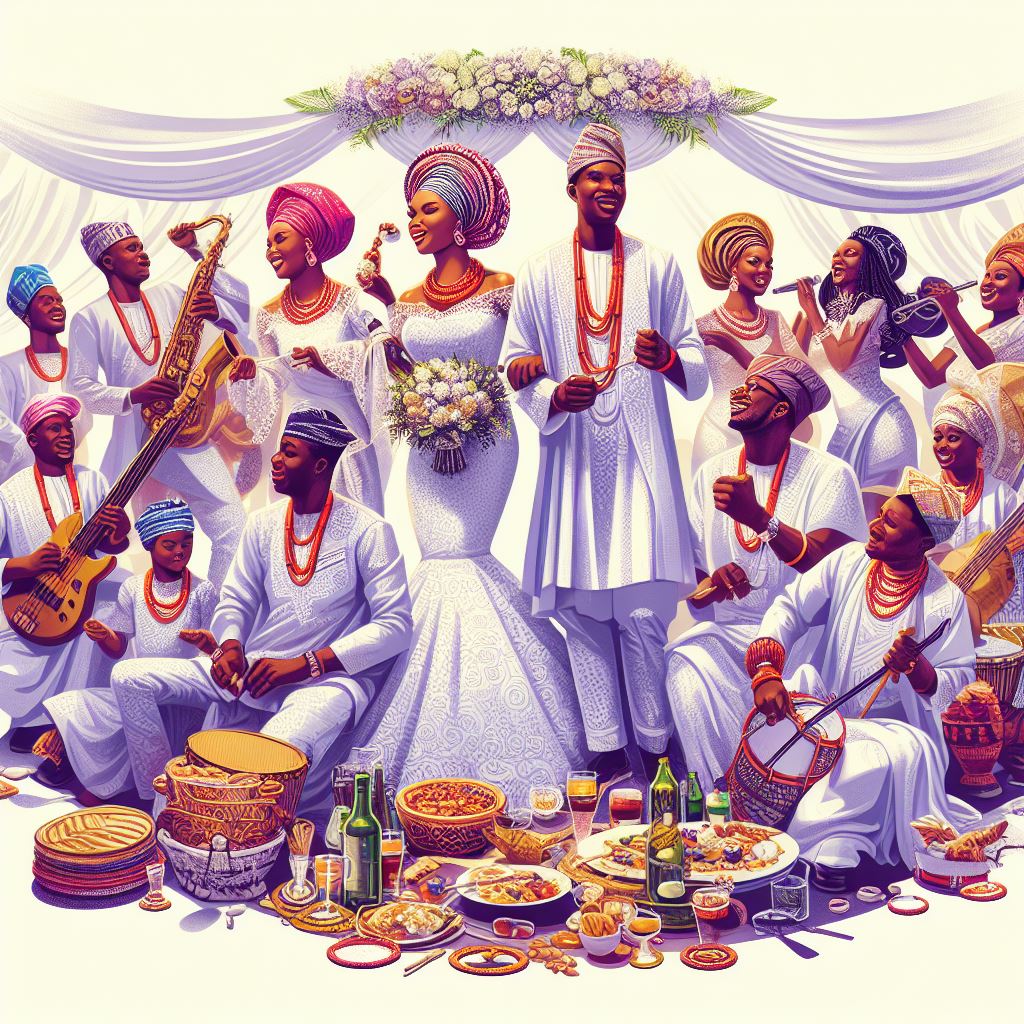The Role of Family in Strengthening Nigerian Marriages
Last Updated on October 16, 2023
Introduction
Marriage is highly valued in Nigerian culture, serving as a cornerstone of societal norms and expectations.
It is not simply a union between two individuals but is seen as a partnership that extends beyond just the couple themselves.
Nigerian marriages are not just about the uniting of two individuals but also about joining two families together.
The family plays a crucial role in the success and strength of Nigerian marriages.
It is believed that the support and guidance provided by both sets of parents and extended family members can greatly contribute to the longevity and happiness of a marriage.
One of the ways in which the family strengthens Nigerian marriages is through their involvement in the matchmaking process.
In many cases, families actively participate in finding suitable partners for their children.
This involvement ensures that couples share common values and backgrounds, increasing the likelihood of a successful and harmonious union.
Furthermore, the family serves as a support system for the couple throughout their marriage. They offer guidance, advice, and emotional support during challenging times.
This support system helps couples navigate through difficulties and reinforces the commitment they made to each other.
In addition, the family plays a pivotal role in resolving conflicts within Nigerian marriages. Family members often act as mediators, helping couples communicate effectively and find solutions to their problems.
This external perspective can provide fresh insights and help couples overcome hurdles that they might otherwise struggle with on their own.
In fact, the family plays an essential role in strengthening Nigerian marriages.
From the matchmaking process to ongoing support and conflict resolution, the involvement of family members greatly contributes to the success and longevity of marriages in Nigerian culture.
Definition of family in Nigerian context
Extended family vs. nuclear family
In Nigeria, family is defined as both the nuclear family, consisting of parents and children, and the extended family, including relatives such as grandparents, uncles, and aunts.
Importance of extended family in Nigerian society
The extended family plays a crucial role in Nigerian marriages as it provides emotional support, childcare assistance, and financial help.
Furthermore, the extended family serves as a support system during challenging times and celebrations.
This close-knit network offers a sense of security and belonging, enhancing the stability of Nigerian marriages.
Cultural values and traditions associated with family
The Nigerian culture places high value on unity, respect for elders, and the preservation of family ties.
These values are reflected in various traditions such as communal living, collective decision-making, and frequent family gatherings.
Family rituals and ceremonies, like weddings and naming ceremonies, strengthen bonds and reinforce cultural identity.
A strong emphasis is also placed on passing down cultural practices, languages, and values to future generations.
Read: Understanding the Dynamics of Marriage Life in Nigeria
Supportive role of family in Nigerian marriages
Role of parents and relatives
- Arranged marriages and parental involvement.
- Advice and guidance from older family members.
Financial support and assistance from family members
- Contributions for weddings and marriage ceremonies.
- Support during difficult times or financial hardships.
Emotional support and conflict resolution
- Mediation and intervention by family members.
- Counseling and guidance for married couples.
In Nigerian culture, families actively shape marriages. Arranged unions, guided by parents, ensure compatibility and security, fostering lasting bonds.
Elders, with wisdom, guide couples through challenges, solidifying family’s pivotal role.
Financially, relatives boost stability, contributing to weddings and aiding in hardships. Emotional support is crucial too.
Family intervenes, mediating conflicts, ensuring amicable resolutions. Counsel and guidance from experienced members further enrich marriages.
In summary, Nigerian families are integral to marital success. Arranging, advising, financially supporting, and resolving conflicts, they ensure a robust foundation for lasting unions.
Read: How Religion Impacts Marriage Counseling in Nigeria

Preservation of cultural values and traditions
Cultural practices within marriages influenced by family
- The family plays a vital role in shaping and preserving cultural practices within Nigerian marriages.
- Through family influence, couples adhere to customs and rituals that have been passed down through generations.
- Traditional marriage ceremonies, such as the Igba Nkwu in Igbo culture or the Kamu in Hausa culture, are kept alive by families.
- The family ensures that couples conform to cultural expectations, such as dressing, language, and behavior during these ceremonies.
- It is through the active participation of families that cultural values within Nigerian marriages are upheld.
Passing down societal norms and expectations
- The family serves as a medium for transmitting societal norms and expectations to couples.
- Parents provide guidance and educate their children about the values, beliefs, and practices that are valued in Nigerian society.
- Teaching about respect for elders, displaying good manners, and understanding cultural taboos are vital for a successful marriage.
- Through family discussions and advice, couples learn to navigate societal expectations and maintain a harmonious union.
- These lessons, passed down through generations, ensure the continuation of Nigerian cultural norms within marriages.
Reinforcement of traditional gender roles
- Family plays a significant role in the reinforcement of traditional gender roles within Nigerian marriages.
- Parents teach their children, from a young age, the roles and responsibilities expected of each gender.
- Men are taught to be providers, protectors, and heads of the family, while women are taught to be caregivers, homemakers, and nurturers.
- Family members provide examples and guidance on fulfilling these gender-specific roles.
- By preserving these traditional gender roles, families contribute to the strength and stability of Nigerian marriages.
Read: Cost of Marriage Counseling in Nigeria: Budgeting for Harmony
Challenges faced by family in strengthening Nigerian marriages
Modernization and Western influences
The rapid modernization and increasing Western influences contribute to the challenges faced by Nigerian families in strengthening marriages.
This is evident in the changing societal norms, where traditional values are often questioned and undermined.
As a result, families struggle to balance their own cultural beliefs with the Western values that are influencing their marriages.
Migration and distance between family members
Migration and the resulting distance between family members pose significant challenges to the strength of Nigerian marriages.
With many individuals leaving their hometowns for better opportunities, families are often separated by long distances.
Physical distance makes it difficult for family members to provide the necessary support and guidance to couples facing marital issues.
Generational gap and cultural clashes
The generational gap and cultural clashes between older and younger family members can strain Nigerian marriages.
Younger generations are adopting more modern and individualistic attitudes towards relationships, which often clash with the conservative values of the older generations.
These clashes can create tensions within families and hinder efforts to strengthen marriages based on mutual understanding and support.
Conflict of personal desires vs. family expectations
Another challenge faced by families is the conflict between personal desires and family expectations.
In Nigerian culture, there is often a strong emphasis on preserving family honor and conforming to societal expectations.
This can lead to individuals feeling pressured to enter or remain in marriages that may not align with their own personal desires and happiness.
Such conflicts can strain marital relationships and make it challenging for families to provide the necessary support for marriage strengthening.
Ingeneral, Nigerian families face various challenges when it comes to strengthening marriages.
These challenges include the influences of modernization and Western values, migration and distance, generational gaps, and conflicts between personal desires and family expectations.
Despite these challenges, it is crucial for families to recognize and address these issues in order to foster stronger and more successful marriages in Nigeria.
Read: Harmonizing Love and Faith: Nigerian Couple’s Anniversary Prayer Rituals
Conclusion
Recap of the importance of family in strengthening Nigerian marriages
Throughout this blog post, we have explored the crucial role that family plays in strengthening Nigerian marriages.
From providing emotional support to offering guidance and advice, family members contribute significantly to marital stability.
They serve as a foundation for love, trust, and unity, creating a nurturing environment for couples to thrive.
Family also plays a vital role in resolving conflicts and promoting healthy communication between spouses.
Their presence fosters a sense of belonging and connection, cementing the bond between husband and wife.
Final thoughts on the role of family as a foundation for marital stability in Nigeria
As we conclude, it is evident that family plays an indispensable part in strengthening Nigerian marriages.
The values and traditions passed down, the support system provided, and the love and care shared among family members contribute to the overall well-being of couples.
In order to maintain strong marriages, it is essential for individuals and society at large to prioritize the preservation and promotion of family values.
By recognizing the significance of family in marital relationships, we can build a society with healthier, more stable marriages.
Let us continue to value and invest in our families, for they are the pillars that uphold Nigerian marriages and pave the way for a stronger, more united society.


